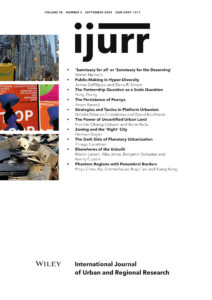This article presents a poststructuralist analysis of zoning practices and their implementation in the global South, critically analysing the development of two parallel housing processes arising as a consequence of zoning: informality and customary land use management systems in peri-urban settlements. Using a Bourdieusian analysis, the article evaluates the tension between zoning and informality in which zoning furthers special interests and creates highly unequal power relations by commodifying space and marginalizing the urban poor. In response, pro-poor forms of counter-conduct such as inclusionary zoning and informality serve to alter the perspective of normative planning and create alternative spaces that generate agency for the urban poor. This raises questions regarding the nature of current zoning practices in terms of social justice and distributive ethics.
Details
Written by:
Herman Geyer
Digital Object Identifier (DOI)
https://doi.org/10.1111/1468-2427.13270
About DOI

